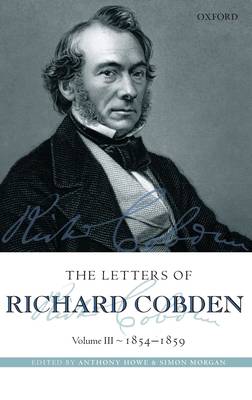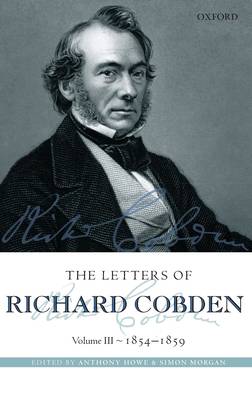
En raison d'une grêve chez bpost, votre commande pourrait être retardée. Vous avez besoin d’un livre rapidement ? Nos magasins vous accueillent à bras ouverts !
- Retrait gratuit dans votre magasin Club
- 7.000.000 titres dans notre catalogue
- Payer en toute sécurité
- Toujours un magasin près de chez vous
En raison de la grêve chez bpost, votre commande pourrait être retardée. Vous avez besoin d’un livre rapidement ? Nos magasins vous accueillent à bras ouverts !
- Retrait gratuit dans votre magasin Club
- 7.000.0000 titres dans notre catalogue
- Payer en toute sécurité
- Toujours un magasin près de chez vous
Description
The Letters of Richard Cobden (1804-1865) provides, in four printed volumes, the first critical edition of Cobden's letters, publishing the complete text in as near the original form as possible. The letters are accompanied by full scholarly apparatus, together with an introduction to each volume which re-assesses Cobden's importance in their light. Together, these volumes make available a unique source of the understanding of British liberalism in its European and international contexts, throwing new light on issues such as the repeal of the Corn Laws, British radical movements, the Crimean War, the Indian Mutiny, Anglo-French relations, and the American Civil War. The third volume, drawing on some forty-seven archives worldwide, reveals the tension between public and private life experienced by Cobden from 1854 until 1859. As prospects for reform at home diminished, he became the prototype for the group A. J. P. Taylor famously called the 'Trouble Makers', articulating a wide-ranging critique of British foreign policy with regard to the Crimean War, Anglo-American relations, the Indian 'Mutiny', and British expansion in Asia. An arch antagonist of the Prime Minister Palmerston, in early 1857 he dramatically defeated the government in the House of Commons over British naval intervention in China (the Arrow incident), and in 1858 played a major part in resisting Britain's annexation of Sarawak. Privately, Cobden experienced anguish at the death of his fifteen-year-old son at school in Germany in 1856, heightened by the inconsolability of his wife Catherine. He was also beset by financial worries, prompting a second visit to the United States in 1859 where he was welcomed as a celebrity, though his primary purpose was to investigate the prospects of the Illinois Central Railroad following the 1857 global financial crisis. On return to Britain, he found himself once more at the forefront of British politics, rejecting an unexpected offer of office in Palmerston's new Cabinet: the first 'modern' Liberal government. The volume concludes with Cobden's lengthy stay in Paris. There, with the support of his friend the French economist Michel Chevalier, and against the background of recent war in Italy and growing Anglo-French antagonism, he was on the brink of completing the negotiation of the path-breaking Anglo-French commercial treaty of 1860: his most important achievement since the repeal of the Corn Laws in 1846, and a vital step towards free trade and peace in Europe.
Spécifications
Parties prenantes
- Auteur(s) :
- Editeur:
Contenu
- Nombre de pages :
- 580
- Langue:
- Anglais
- Collection :
Caractéristiques
- EAN:
- 9780199211975
- Date de parution :
- 07-09-12
- Format:
- Livre relié
- Format numérique:
- Genaaid
- Dimensions :
- 156 mm x 234 mm
- Poids :
- 984 g

Les avis
Nous publions uniquement les avis qui respectent les conditions requises. Consultez nos conditions pour les avis.






